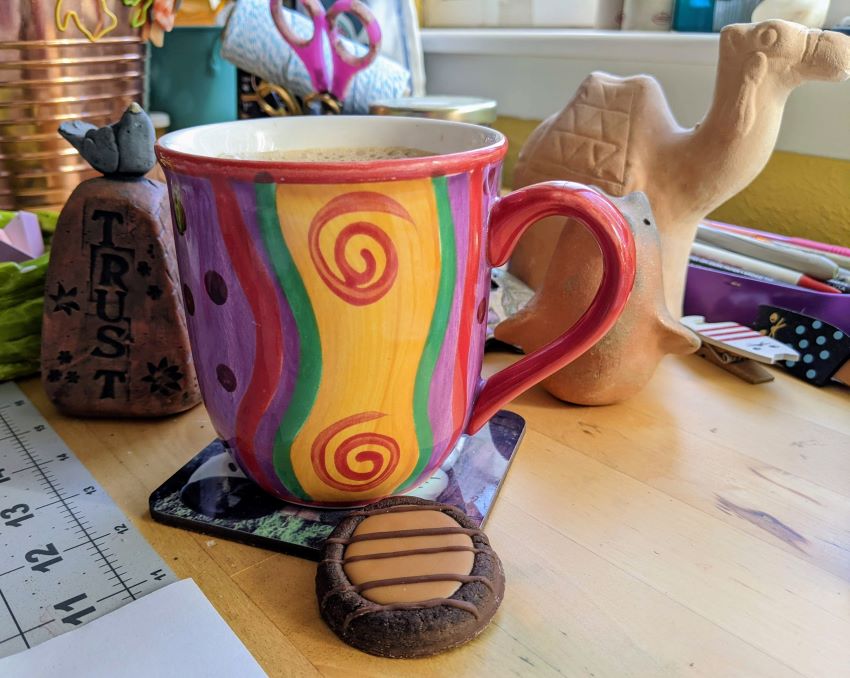Again, I am late writing about the books I read (or listened to) last year - but better late than never.
In 2021 I read 64 books, seven of them were audiobooks (so "read" is probably not the right term). As I do every year, I wrote all of the titles and authors down and used my very own star system for books I enjoyed more than others. Usually I give one star for a good read and two stars for a very good read, but last year for the very first time I had to introduce three stars - just once. Everything else without a star is an average read. I still need to figure out how to "star" exceptionally bad reads. Usually I don't finish those and note that in my list, but in 2021 I finished all the books.
Most of the books I read on my Kindle Paperwhite. It's so easy to take it anywhere and wherever I am I have an entire library with me. I don't like to schlepp any books with me anymore like I used to do for most of my life.
But of course there are still "real" books I'm reading like "The Four Agreements" that I took home from work. That was at the beginning of the year, I had just processed all of the copies and was quite curious about this book. It ended up in the one-star category.
"A Stone in my Hand" was another book from the high school library that I enjoyed. It's written from the perspective of a pre-teen Palestinian girl who lives in Gaza. It was highly educational.
More one-star reads were "The Story of Arthur Truluv" by Elizabeth Berg (I have yet to read a book by her that I don't like), "The Moonlight Child" by Karen McQuestion, "The Light Through the Leaves" by Glendy Vanderah, "The Key" by Kathryn Hughes and "The Keeper of Lost Things" by Ruth Hogan that I listened to. "Nomadland" by Jessica Butler, "Freckled" by TW Neal (she usually writes mysteries as Toby Neal, but this one is about her childhood in Hawai'i), "Where the Forest Meets the Stars" by Glendy Vanderah, "Dovetail" by Karen McQuestion (audiobook), "The Paper Bracelet" by Rachael English (another eye-opener about a home for unwed mothers in the 1970s in the West of Ireland) and "The Midnight Library" by Matt Haig (audiobook, narrated by the wonderful Carey Mulligan) all received two stars,
One Saturday our German School had a book sale in the parking lot of our campus. I got a few German books that interest me - "Nordlicht" is another mystery that is set in the North of Germany. These kind of 'local' mysteries are quite popular (I read quite a bit of those on my Kindle). This was quite interesting since it was set in a small town on the German-Danish border and I learned quite a bit about this special area that I wasn't aware of before.
The book at the bottom is of special interest for me. It's about displaced Germans after WWII, mainly those who had to flee from the approaching Soviet Army in the Eastern regions of the country. This is what happened to both my parents and their families.
Two of my German students gave me books as well - one because I love to read mysteries, and one because he wanted to know my opinion about it.
"Northern Spy" is more than just a mystery, it's about how the IRA still operates 20 years after the Good Friday Agreement. I had no idea and this book was a hard-to-swallow lesson. "On Being German" with the subtitle "A Personal Journey Into the German Experience" mainly angered me. The only interesting part was the diary of the author's mother about the time when they had to flee from their home in East Prussia. But the rest was hair-raising and appaling.
If someone is indeed interested in a "personal journey into the German experience" I recommend this book:
I have this book in both German and English (Nora Krug wrote both of them herself, no translator) and this is my three-star read. Nora Krug is 17 years younger than I am, but her experience, her way of coming to terms with German history, the guilt and how to define "Heimat" (home or homeland - there really is no equivalent English word for it) is very similar to my own experience, even though I grew up in a refugee family while her family came from and had lived in the Southwest of Germany (these are two very different conditions that you are mainly aware of when you belong to the refugee side). So much sounded familiar. This is not a "regular" book - all is "hand printed" with the author's own illustrations, historic photographs and documents. Here's an example:
I owe it to my German friend B. who told me about this book.
You do know that reading makes thirsty, right? And since this is a T Tuesday post I'm showing a drink at my favorite place to read - in the garden with a glass of rosé. Life can be good.


















































